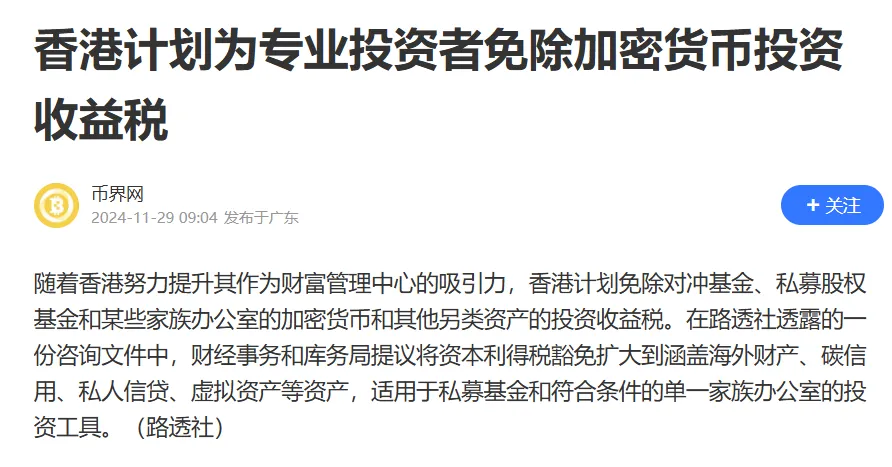When considering where to set up an investment vehicle to invest in virtual assets, whether it is a fund or a single family office investment vehicle, tax issues should be the first consideration. Hong Kong is known for its favorable tax policies. For example, it adopts the territorial principle, which means that companies are only taxed on profits generated in Hong Kong. This creates a favorable environment for international companies because foreign income is not taxed.
▲Sina News screenshot
Now, when we talk about “profits tax” in Hong Kong, there are some important tax exemptions. However, until recently, virtual assets have not been included in the list of tax-exempt assets in Hong Kong.
However, this is about to change...
Proposed changes to the tax treatment of virtual assets in (i) private equity funds and (ii) single family office investment vehicles
Currently, Hong Kong is seeking public opinions on the introduction of a new profit tax exemption policy for virtual assets. In its consultation letter, the Financial Services and Treasury Bureau of Hong Kong proposed expanding the scope of the existing profit tax exemption to cover (i) private equity funds and (ii) investment vehicles of single family offices, including but not limited to:
Overseas real estate
Carbon credits and emissions derivatives or allowances
Private credit investments and loans
Virtual Assets
(i) Private equity funds
In Hong Kong, there is a unified tax exemption system that provides profits tax exemption for qualifying private funds, including those established in the form of limited partnership funds and open-ended fund companies. Under this system, private funds can enjoy profits tax exemption on income (such as capital gains, interest and dividends) arising from their investments, provided that they meet certain criteria. These conditions include being managed by an investment manager licensed under the Securities and Futures Ordinance and the fund's activities must be primarily investment-related rather than commercial or trading activities.
However, until now, there has been controversy as to whether virtual assets can be included in Hong Kong private funds and whether this would affect the applicability of Hong Kong’s unified tax exemption regime. Therefore, the new proposal brings much-needed clarity to this issue, indicating that virtual assets can indeed qualify as “qualifying investments ” and therefore enjoy profits tax exemption.
It is worth noting whether the government will further clarify in the consultation document the tax treatment of other cryptocurrency-related income or derivatives. For example, it is not clear how cryptocurrency-related income such as staking rewards should be classified and taxed in Hong Kong.
(ii) Single Family Office Investment Vehicles
Currently, Hong Kong has a law that ensures that eligible single family office investment vehicles can enjoy profits tax concessions, providing a preferential tax rate of 0% applicable to assessable profits from qualifying transactions and incidental transactions. However, virtual assets are currently not within the scope. Therefore, if the new proposals put forward in the consultation paper come into effect, the scope of designated assets will be expanded to include virtual assets, etc. Virtual assets will include common crypto assets such as Bitcoin, Ethereum, as well as certain utility tokens, security tokens and stablecoins.
Potential impact of Hong Kong as a virtual asset hub
Hong Kong’s introduction of a profit tax exemption policy for virtual assets will have a profound impact on the entire crypto industry. Here are some specific potential impacts:

▲News screenshot
1. Attract global investors
The new tax policy will attract investment managers and high net worth individuals around the world to consider Hong Kong as their preferred virtual asset investment center. In particular, hedge funds and family offices seeking to maximize after-tax returns may prefer to set up investment vehicles in Hong Kong. In addition, this policy may also attract international virtual asset exchanges, custody service providers and other ecosystem participants to expand their businesses in Hong Kong, further consolidating Hong Kong's position in the global crypto industry.
2. Promote local economic growth
As more investment managers and family offices settle in Hong Kong, local professional service industries such as law, accounting, taxation, and banking will also benefit from additional demand. This will not only help promote the growth of related industries, but also lead to an increase in employment opportunities. At the same time, the Hong Kong government has demonstrated its support for encryption technology and virtual assets through such policy orientation, and has also provided confidence to attract more technology-based companies.
3. Encourage innovation and ecosystem development
Hong Kong's inclusive attitude towards virtual assets and clear tax policies will encourage more startups, developers and investors to enter the virtual asset field. This may accelerate innovation in areas such as decentralized finance (DeFi), blockchain infrastructure, and tokenized assets. The rapid development of these emerging fields will make Hong Kong not only a center for capital accumulation, but also a laboratory for global crypto innovation.
4. Enhance international competitiveness
Currently, Hong Kong and Singapore are competing fiercely for the position of Asia's virtual asset center. Hong Kong can gain an advantage in this competition by offering competitive tax policies, especially in attracting virtual asset funds and family offices. Singapore's Goods and Services Tax (GST) on virtual asset transactions may make Hong Kong more attractive in this regard. In addition, Hong Kong's close ties with mainland China also provide unique strategic advantages for international investors who want to enter the huge mainland market.
Things to watch out for next
The consultation period for the Request for Comments will end on January 3, 2025. We will be closely monitoring the Request for Comments and its conclusions to share further with you the impact of these new changes on the industry.












